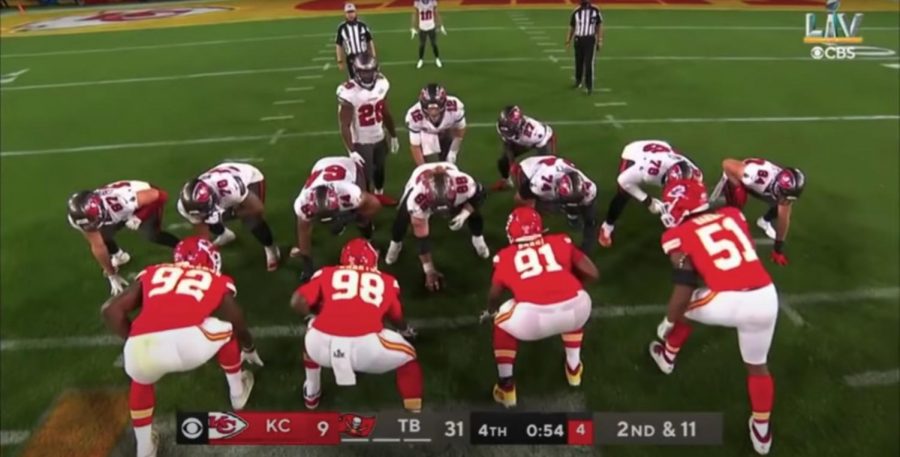COVID-19 Isolation Major Factor in Super Bowl Viewership
February 16, 2021
Tampa Bay Buccaneers defeated the Kansas City Chiefs 31 to 9 in Super Bowl LV, a game that featured the veteran football icon Tom Brady earning his seventh career Super Bowl win. He did so against an extremely talented Chiefs team led by superstar quarterback Patrick Mahomes.
There were dozens of great storylines before and throughout the game, but just one major headline after the game: Not many people watched.
According to CNN, the Super Bowl averaged only 96.4 million viewers this year, which may sound like a lot, but viewership is down from averaging 102 million viewers last year. This was, in fact, the lowest rated Super Bowl since 2007, due to the pandemic affecting viewership.
The online halftime show, the limited crowd capacity, and the overall feel of the Super Bowl felt a little off for many viewers. This has been a common complaint against professional sports in general for the past year. Massive sporting events have been forced to adapt to social distancing protocols, and the stubbornly giant scale of these sporting events juxtaposed with the absence of people being present creates for a confounding experience at times.
Senior nursing student Hannah Garcia is an example of somebody who was put off by the different nature of this year’s big game.
“I watch the Super Bowl every year, but this time I knew it wasn’t going to be a party. I honestly kind of forgot it was even happening… I didn’t know who was playing until the week leading up to it,” Garcia said.
Garcia was one of the many who decided to skip this year’s game despite watching it last year.
Anna Lord, a sophomore psychology major, had the game on with her family, but nobody really tuned in.
“It wasn’t much of a game,” Lord said. Lord also cited the fact that watching Tom Brady (who infamously came back to embarrass the Atlanta Falcons in Super Bowl LI) was not exactly a reason to focus on the television.
The fact that the Super Bowl was not seen as a big celebratory event where friends and family could get together and watch seemed to be the main factor in students not watching the game.
There is not much of a hometown factor, with nearby teams like the Falcons and Jaguars not playing. Most people who do not have a team to root for only watch the Super Bowl for the social aspect, and that was diminished this year.
For many students attending a Super Bowl party for the social aspects, the risk combined with the different atmosphere made it not worth it.
From surveying a pool of college students, one of the most socially active and media-consuming demographics that exists, the pandemic impacted viewership in a variety of ways.
The American social environment has never been more fragile. With Super Bowl parties becoming as rare as they ever have been, people have far less of a reason to watch the big game. This is especially true when the game is as one sided as it was this year.
The limited capacity of games is simply hard to get over, and makes for an unusual atmosphere. It makes complete sense that fans who are not completely die-hard would rather miss the games that do not have people in the stands. One day, these games will feel like anomalies from a strange era.
Sports are a constant reminder of COVID-19. The pandemic, the effects, the challenges, and everything else are constantly on full display during sporting events. It is the most important storyline in sports, therefore it will be talked about constantly.
There is no easy lesson to learn here for the National Football League (NFL). A significant viewership loss was completely inevitable, but that does not make the pill any easier to swallow. The reality is that the NFL has the onus of making people excited about the Super Bowl. This is especially true considering the massive prices they famously charge to advertisers.
The good news for the NFL is that next year has a great chance to be different. People like hanging out with their friends and watching the Super Bowl. If social distancing relaxes next year, people will likely party significantly harder than they usually would, if only to make up for lost time.
It is almost certain that the NFL will eventually recover from this hit, especially if next year is a success, but this will always be remembered as a massive down note to cap off what may go down as the most challenging overall season in NFL history.
Despite the setbacks and the underwhelming viewership of the final product, the NFL put on a full complete season. That is an obvious accomplishment that should not be taken for granted.




